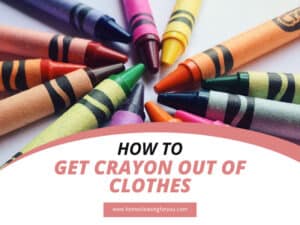Simple Methods for Removing Detergent Stains From Clothes
In this article, I shall show you all you need to know about how to get detergent stains out of clothes.

Funny how the detergent we use every day to wash off stains is the reason for a different type of stains on our clothes. However, as odd as it sounds, this is actually a very common problem that many people deal with.
Dealing with detergent stains is not too difficult since they are not stubborn. But if you don’t know the correct ways to remove them, there will be problems. So let’s learn more about all methods for removing detergent stains with this post.
Why Does Detergent Stain Clothes?

We all know that the function of laundry detergent is to keep our clothes clean and stain-free. But there can be many reasons why detergent can cause stains in clothes.
1. Too Much Detergent
This is the most common cause of detergent stains. You know what they say, less is more. Adding way too much detergent to your washing machine can be counterproductive.
It is said that putting two teaspoons of detergent (more than the recommended amount) can cause detergent residue on clothes.
2. Hard Laundry Water
Hard water means that it has high mineral content(1), and laundry water with high mineral composition can’t dissolve powder detergent well. This will eventually lead to excess detergent and stains.
3. Too Many Clothes In 1 Load
When you put too much laundry in 1 load, the clothes won’t get cleaned properly no matter how much detergent you put in. Additionally, the detergent will leave its residue on your clothes, resulting in detergent stains and foul odors.
4. Improper Agitation
This refers to when the water can’t dissolve the detergent before the washing cycle. As mentioned before, the combination of hard water and powder detergent can cause this. But this can also happen if you use cold water, low-quality detergent, or out-of-date detergent.
Let’s see what happens when you use too much detergent, spoiler alert, it doesn’t look good!
7 Methods To Remove Detergent Stains
Compared to other stains like oil, grease, food stains, detergent stains are much easier to deal with. With that being said, you still need to know the right products and techniques to get the best results.
1. Rubbing Alcohol

Rubbing alcohol is one of the most common products to deal with this problem because of its accessibility and effectiveness. Not only is it powerful enough to break down both powder and liquid detergent stains, but it is also gentle enough to not damage the fabrics.
Additionally, rubbing alcohol is the recommended method to treat stains from detergent pods.
Step 1: Soak it
Fill your sink with warm water and soak your clothes in it. Hot water is even better but be careful not to scald yourself. Rub the garment every now and then to get the stains out.
Step 2: Add Rubbing Alcohol
If you are working with colored clothes or delicate fabric, it’s a good idea to do a spot test. Dip a q-tip in the alcohol and rub it on the inside of your clothes, then wait a few minutes. If the alcohol doesn’t damage the color or the fabric, it’s safe to treat the stains with it.
Pour some rubbing alcohol on a sponge or cloth and rub it on the stained area. Let it sit for about 15 minutes. Then give it a rinse under warm running water.
Step 3: Wash It
Put the clothes in the washing machine without detergent and choose the hottest water setting. Once done, take it out and recheck the stained area. If you can still see the stains, put it back in the washing machine and run it again.
Do not tumble dry your clothes unless the stains are completely gone.
2. Baking Soda

Baking soda is considered a household staple for a reason. Not only is it a must in many baking recipes, but its ability to remove stains is also incredible(2).
Step 1: Add Baking Soda
Pour in the washer’s drum ½ cup of baking soda. You can also add a cup of white distilled vinegar to boost its strength. Do not add any detergent.
Step 2: Wash It
Put your clothes in the washer and pick the hottest water setting that they can withstand. Then give it a spin. Afterward, allow the clothes to air dry.
You can also use your tumble dryer, but you have to ensure that the stains have disappeared.
3. Vinegar

Vinegar is another kitchen mainstay that can also be used to deal with stains. However, when you use them for cleaning purposes, stick with white distilled vinegar. Some vinegar, like balsamic, contains colored tannins that might stain your clothes (3).
Step 1: Soak It
Soak your clothes in a sink with warm water. Again, you can also use hot water, but it can be dangerous to you and your clothes.
Step 2: Add Vinegar
Pour in 1 cup of white vinegar and mix it around. Then let it sit for 30 minutes to 1 hour.
During this time, check your clothes every 10 minutes and rub the stains with your fingers. This will further eliminate the detergent residue that the vinegar has broken down.
Step 3: Wash It
Squeeze out the excess water and wash your clothes without using detergent, set the water temperature to high. When it is done, allow your clothes to air dry.
4. Lemon Juice

Similar to vinegar, lemon juice is also known for its stain-removing ability. Let’s have a look at how you can get detergent stains out with it.
Step 1: Soak It
Put your clothes in a sink and run warm or hot water into it. Make sure that the garment is completely soaked.
Step 2: Add Lemon Juice
Cut up some lemons and squeeze out the fresh juice to get about 1 cup of lemon juice. Remember that we are working with real and fresh lemon, store-bought lemon juice may contain additives that reduce its cleaning ability.
Mix a bit of lemon juice with some salt and rub it on the stained area, rub it gently to work the stains out.
Pour the rest of the lemon juice into the sink and let the clothes sit for about 1 hour.
Step 3: Wash It
Run a cycle without detergent and the hottest water setting. Air drying your clothes is the best option.
5. Bar Soap

You may wonder, why should I use bar soap to remove soap stains? But soap is a great solution to break up the detergent residue and eliminate stains.
Step 1: Soak It
Soak the clothes in a sink filled with cold water. Yes, for this method, we’re using cold water instead.
Step 2: Soap It
Castile soap is recommended. However, any plain soap bar will work just fine.
Rub the bar soap on the stained area and scrub it with your hand. Using an old toothbrush is even better because it can work the soap further in the clothes and get rid of the residue.
Step 3: Rinse And Repeat
Rinse the clothes under cold running water and continue to add soap and scrub. Once you no longer see the stains, move on to the next step.
Step 4: Add Vinegar
Add ½ cup of vinegar to the sink and mix it well. Let the clothes soak in the solution for about 15 minutes.
Step 5: Wash It
Rinse the clothes well and put them in the washing machine. Replace detergent with ½ cup of baking soda or just skip the detergent altogether. Recheck the stains before putting them in the dryer (or air dry them).
6. Dish Soap

Running out of bar soap? Well, dish soap is equally effective. The way it works is similar to bar soap as well, let’s take a look.
Step 1: Soak It
Just like before, fill your sink with cold water and drop your clothes in it. Add a few drops of dish soap and mix it well.
Step 2: Add Dish Soap
Pour more dish soap right on the stained area and scrub it with your hand or an old toothbrush. Continue to rinse and scrub if the stains remain. Once you’re happy with the result, let it sit in the soapy water for 10 minutes.
Step 3: Wash It
Wash off all the dish soap before putting it in the washing machine. No need to add detergent. Air drying is recommended since the heat from the tumble dryer can set the stains.
7. Stain Remover Spray
Stain remover spray can eliminate almost all types of stains, and that of course includes detergent stains. For this method, I suggest using advanced-action gel or heavy-duty stain remover laundry spray.
Step 1: Spray It
Give the bottle a shake and spray it directly on the stained area. Let it sit for 5 minutes or overnight, depending on how tough the stains are.
Step 2: Wash It
Wash your clothes with your favorite laundry detergent and the hottest water setting. If you can no longer see the stains, air dry your clothes or use the tumble dryer.
Note that this method is not suitable for colored clothes or clothes with delicate material. However, nowadays, there are laundry stain removers that also work on colored fabric.
Learn How To Prevent Detergent Stains With These Simple Tips
In order to get detergent stains out of clothes, you might have to rewash your clothes a couple of times. This can damage the fabrics and shorten your clothes’ lifespan.
Even though learning about removing detergent stains from clothes, the best solution is to prevent this problem from happening in the first place. Here’s how:
1. Avoid Using Too Much Detergent
Always follow the manufacturer’s instructions on the package to determine the right amount of detergent required for each load. You might think adding more detergent will help clean your clothes better, but that is not true.
2. Don’t Overstuff Your Clothes
I know it’s tempting to wash all your laundry in 1 load, but you must avoid this to prevent detergent stains and mildew in clothes.
Separate your clothes into smaller loads and wash them individually. You might think it is a waste of time but trust me, rewashing them later is even more time-consuming and wasteful.
3. Dissolve The Detergent In Water Beforehand
If you use powder detergent, you should mix them with water before adding them to your washing machine. This will prevent improper agitation.
4. Throw Away Out-Of-Date Detergent
Liquid or powder, out-of-date detergent is harmful to your clothes and your health. Detergent usually remains viable for 6 months to 1 year after opening the cap, so check the expiry date carefully before using.
5. Switch To Liquid Detergent
Powder detergent doesn’t dissolve well in hard water and sometimes cold water. So switching to liquid detergent is recommended in this case.
Take a look for more tips on how to wash clothes properly!
More Reasons To Stop Using Too Much Detergent

Besides detergent stains, there are far worse reasons for not adding too much detergent in your load of laundry.
1. Skin Problems
Too much detergent will lead to detergent residue in clothes. The excess detergent will irritate your skin, causing rash and even allergies.
2. Bad Odors In Clothes
Detergent residue also causes mildew in clothes. And mildew will make your clothes smell sour and nasty.
3. Reduced Efficacy Of Washing Machine
Too much sud from the laundry detergent will make your washing machine become less productive. Sometimes, this can even make the machine malfunction.
FAQs
Still have some concerns? Check out these frequently asked questions for more information on this subject.
Save Your Clothes From Detergent Stains
After reading this article, I hope you know exactly what to do to deal with detergent stains. Depending on what you already have at home, choose the method you like the most and remove those ugly detergent stains from your clothes.
Did you find this post helpful? Tell me what you think in the comment section. Also, remember to like and share this article if you like. I wish you all the best and take care!

Reference
- Wikipedia, 2021. Hard water.
- Wikipedia, 2021. Sodium bicarbonate.
- Wikipedia, 2021. Vinegar.







Samantha Lee
Head Cleaning Expert
Expertise
Professional Home Cleaning, Green Cleaning Techniques, Stain Removal & Fabric Care, DIY Home Maintenance & Organization, Sustainable Cleaning Products, Home Care for Busy Lifestyles
Education
University of Denver
Samantha Lee is the Head Cleaning Expert at HomeCleaningForYou.com, specializing in eco-friendly home care. She holds a Bachelor of Science in Environmental Science from the University of Denver, focusing on sustainable cleaning solutions.
With expertise in green cleaning, stain removal, and DIY home maintenance, she helps homeowners keep their spaces fresh and chemical-free. Samantha has been featured in lifestyle publications and has partnered with brands promoting natural cleaning products.
She also shares practical tips through her blog, online courses, and workshops. Passionate about sustainability, she enjoys testing new eco-friendly cleaning methods and spending time outdoors.